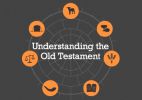The Prophets of the Old Testament
Discover how to understand some of the toughest books in the Bible.
The prophetic books are amongst the toughest books in the Bible to understand and make up a quarter of the Old Testament. What makes matters even more complicated is that not all the prophets in the Old Testament are found in these prophetic books. So first lets start from the top, what is a prophet?
What is a prophet?
Prophets were particular people who were chosen by God and given authority to speak on his behalf. God the Holy Spirit spoke in and through them. It was through the prophets that God chose to reveal himself, his promises and his plan. Before a prophet spoke to the people, they always made it clear, where the message was coming from. ‘This is what the LORD says’ (Isaiah 48:17).
The prophets had a unique role as intercessors, as they spoke not only on God’s behalf to the people, but also on behalf of the people to God (Exodus 32:30-32/ 1 Samuel 7:5-9; 12:19-23/ 2 Kings 19:4 / Jeremiah 7:16; 11:14; 14:11).
The prophets’ predictions were sometimes given in order to deliver warnings to God’s people. They were given a chance to turn away from their own ways and back to Gods. The prophets were reformers, who enforced God’s law and called God’s people to faithfulness.
Who were the prophets?
Abraham was the first person to be designated as a prophet (Genesis 20:6-7). After Abraham the prophets came from a whole range of backgrounds. To just mention a few, Moses was raised as an Egyptian prince, Amos was a herdsmen, Elisha was a plowman, Ezekiel and Jeremiah were priests and Daniel was a government administrator. It is clear that their authority did not come from their own merit but from being chosen by God.
Where and when did they prophesy?
It’s easy to understand what Abraham, Moses, Joshua, Samuel, Nathan, Elijah and Elisha were saying to their audience because their prophecy is placed within a clear narrative. However the prophetic books don’t always provide a clear narrative. Since context is everything, here is a quick overview of the context of just some of the prophetic books.
- Amos and Hosea were in the northern kingdom, in the lead up to its destruction in 722 BC by the Assyrians.
- Prophets such as Isaiah, Micah and Jeremiah were in Judah (southern kingdom) and prophesied in the lead up to the exile in 597/586 BC.
- Ezekiel and Daniel prophesied during the exile.
- Prophets like Haggai, Zechariah and Malachi prophesied after the return from exile.
What was their message?
Their message was either of hope or judgment. Their proclamation to God’s people was centred upon the Mosaic covenant (19:3-6). Through Moses, God revealed his law to his people and it was this covenant that all future generations were to live by. The prophets who followed Moses enforced the covenant, continually exhorting the people to obey God’s law, whilst reminding them of the consequences of their obedience (blessings) and their disobedience (curses). The prophets communicated both orally and through symbolic action. For three years Isaiah went naked and barefoot to demonstrate to the people their future (Isaiah 20:1-6). Hosea married the unfaithful Gomer, to demonstrate God’s relationship with unfaithful Israel (Hosea 1-3).
Who were they speaking to?
- Gods chosen people. The promises made to Abraham revealed God’s plan for a people who would declare and reveal him to all the nations. In Exodus through to Deuteronomy, Moses revealed how they are to live in relationship with God and live as a kingdom of priests. The prophets who came after them therefore addressed Israel as God’s chosen people who have responsibilities to uphold (Jeremiah 2-6).
- Unfaithful Israel. Israel continually broke the Ten Commandments (Jeremiah 7:1-15/ Hosea 4:2), committed idolatry (Ezekial 8:1-18), mistreated others (Isaiah 1:21-31) and refused to repent (Amos 4:6-11).
- Those who were to face judgment. Judgment was frequently called the “day of the Lord” (Isaiah 2:12-22/ Joel 2:1-11/ Zephaniah 1:7-18).
- Those who have hope. After the Day of Judgment, where Israel suffers destruction and punishment, God will bring peace to the world (Isaiah 9:2-7; 11:1-16). A Saviour must suffer and die and then rise from the dead (Isaiah 52:13-53:12). He will bring in a new covenant and he will cleanse the world of sin and make a new earth that will not pass away (Isaiah 65:17-25/ Zephaniah 3:8-20). This Saviour was first revealed as the king who could come from the line of David (2 Samuel 7).
Why understand Old Testament prophecy?
Throughout history humanity pretty much stays the same. As Christians, we now enjoy the blessings and hope of the new covenant through Jesus. However we cannot disregard Old Testament prophecy. We still struggle to trust God and live his way. So we are to solemnly listen to the prophets warning against idolatry, ignoring God’s law, giving into greed or being indifferent towards the poor and those who are suffering. The prophets remind us that we cannot get lost in our sin and presume that we are still members of the new covenant community. For we too will face judgment and failing to repent from our ways and continue to reject Jesus as Lord of our life will mean we too will face eternal separation from God.





